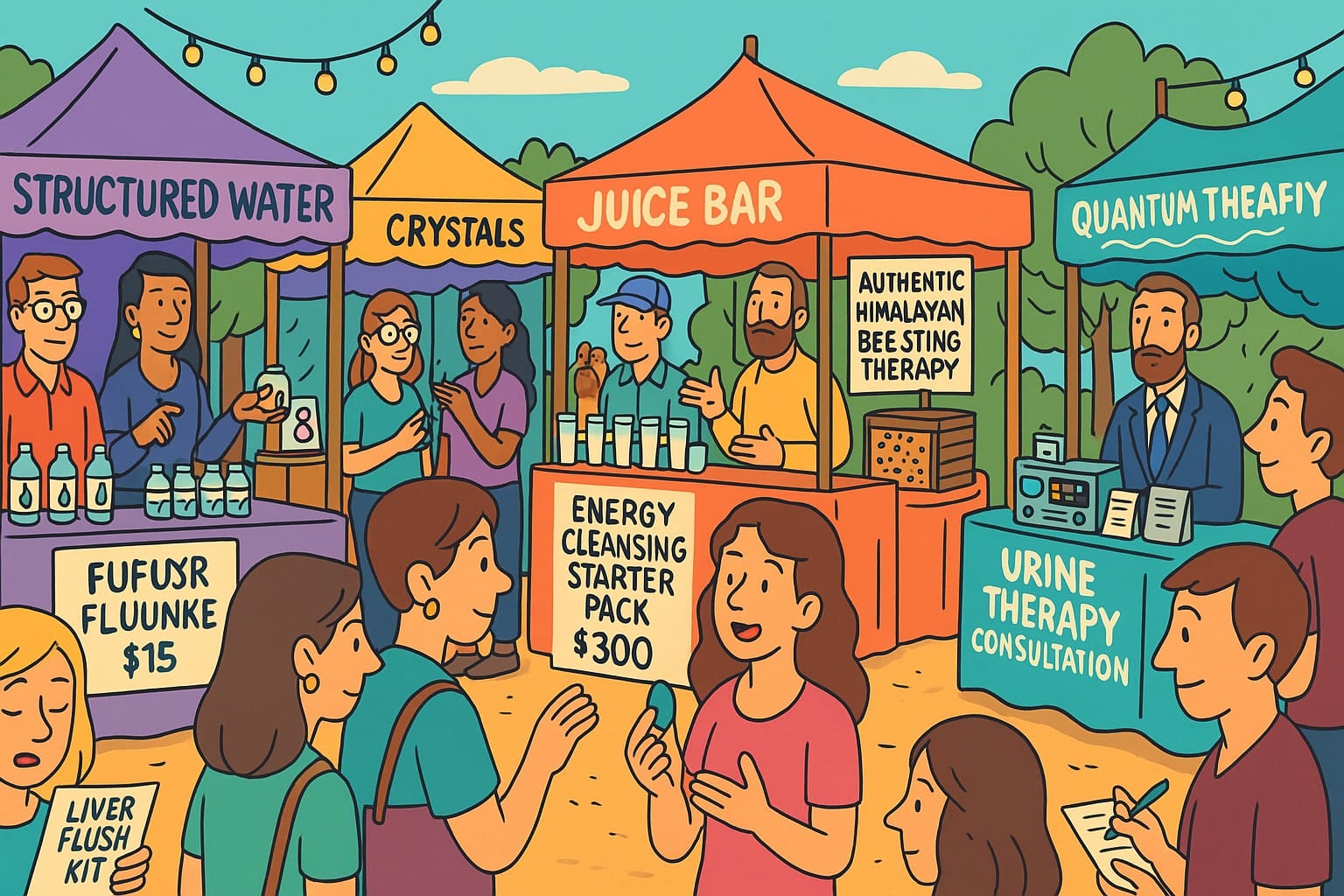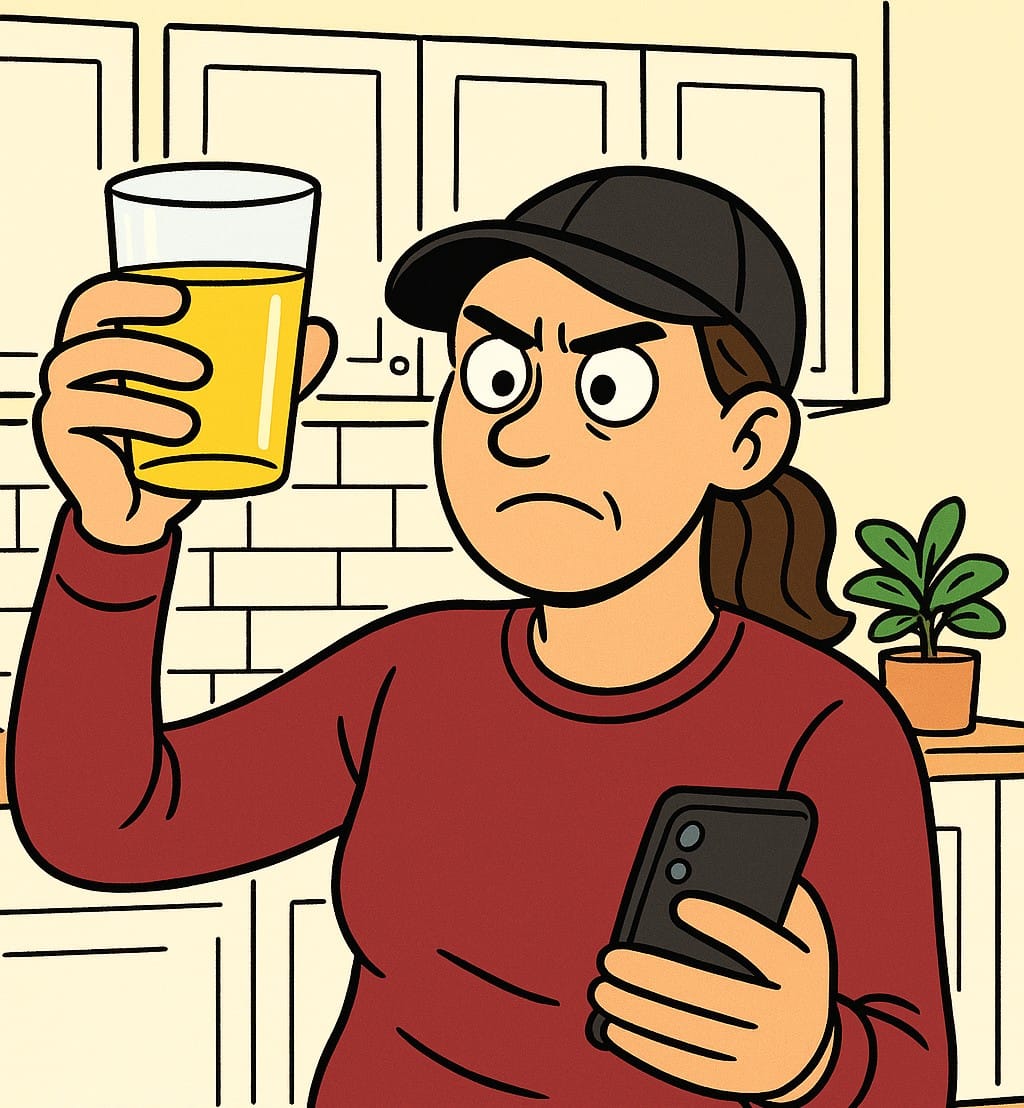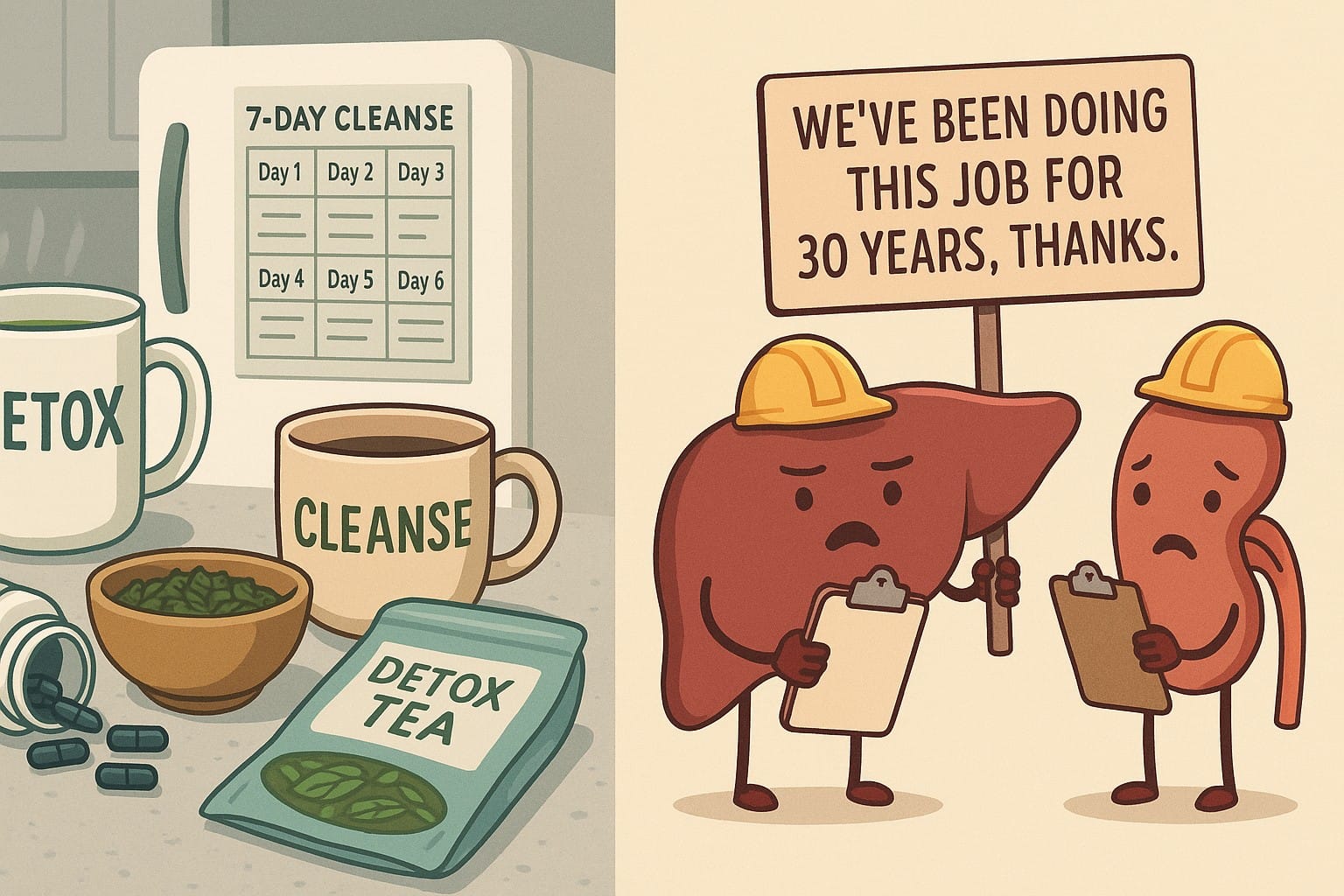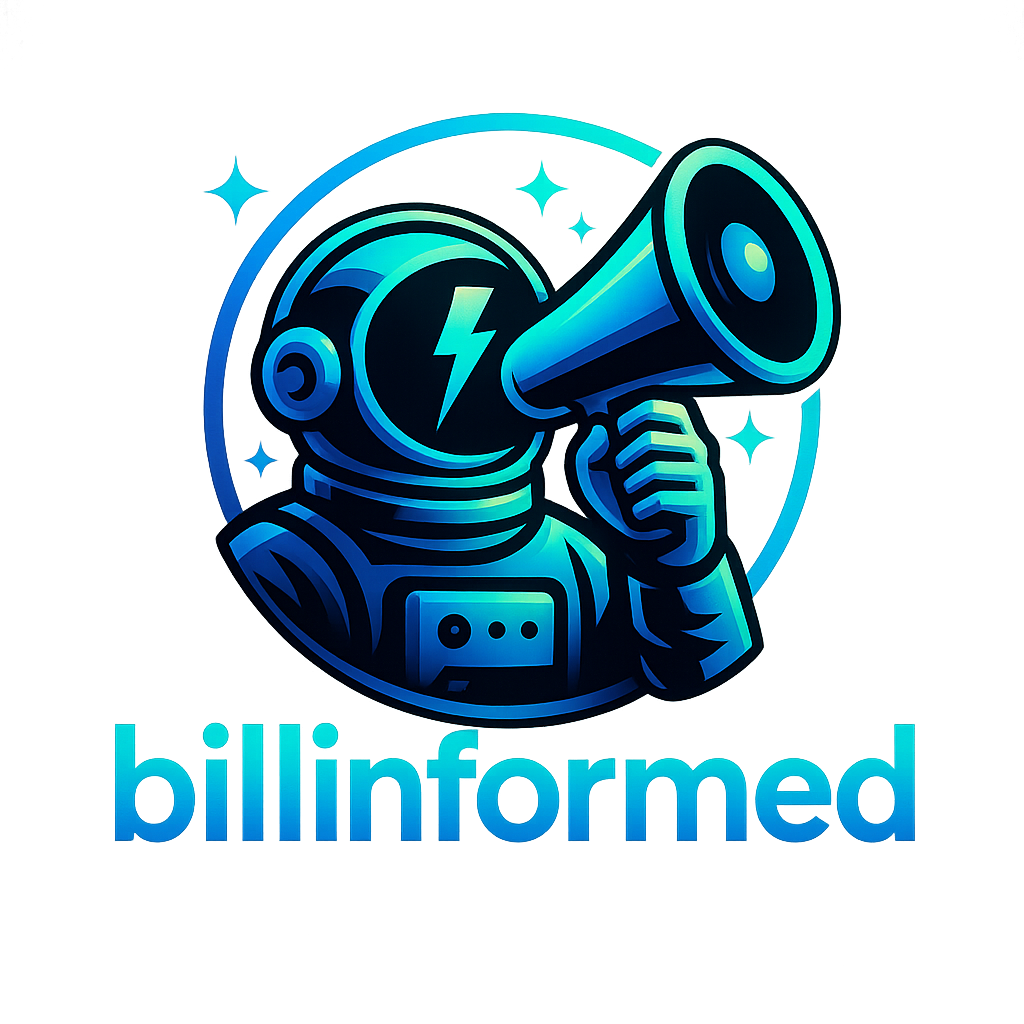Or: What I learned watching friends disappear down wellness rabbit holes
So, here's something mildly humiliating. I once dropped eighty bucks on "Turkesterone."
This fitness YouTuber—the kind with biceps that could probably bench press me—swore it was "nature's anabolic." Said it would "unlock my genetic potential."
I bought it. Obviously.
I also convinced myself that expensive fat-burning pills were markedly different from caffeine. Spoiler: they weren't. And yes, I was tempted to buy that vibrating belt from the 3 AM infomercial, might work if I just...believed hard enough?
But you know what? I lucked out.
While I was throwing money at questionable testosterone boosters, my friends were diving into wellness trends that made my supplement cabinet look downright scientific.
I've watched a friend explain why celery juice at 6 AM would "cleanse their liver." Watched another drop three hundred dollars on crystals to "realign their energy field." Watched someone I care about try coffee enemas, jade eggs, and something called "light language healing."
That last one involved forty minutes of someone speaking made-up cosmic gibberish. To heal trauma. They legit believed it’s for real.
None of these people are idiots. One has an MBA. Another debugs software for a living. One has a chemistry degree.
But somehow, the wellness world convinced them that feeling better required increasingly weird interventions.
Maybe you've been there. Scrolling Instagram at 2 AM, wondering if that influencer might actually know something the rest of us missed. If those testimonials about miracle cures could be real.
Welcome to the club. We meet for regular coffee—not the mushroom kind—and we're trying to figure out how to care about our health without losing our minds and money.
Or our friends.

The Popular Kids: When Wellness Goes Mainstream
Here's how it usually starts. Something reasonable. Something that makes sense.
Take detox teas.
The logic feels bulletproof: modern life dumps toxins into your body. Your poor organs are overwhelmed. This special tea blend helps your body remember how to clean itself.
Except your liver is already a detox machine. It's like a bouncer who never sleeps, never takes breaks, always checks IDs. Your kidneys are the backup bouncer. They're really, really good at their jobs.
These teas? They're expensive diarrhea in a pretty package.
But I get it. There's something satisfying about believing your problems have simple solutions. You're tired? Must be toxins. Drink this, poop for three days, emerge transformed.
It beats the actual answer, which is usually something boring like "get more sleep."
Crystal healing hits different.
Have you held a piece of smooth amethyst? It's gorgeous. Calming. Makes you feel connected to something ancient and mysterious. The idea that different stones have different healing properties feels almost...logical?
I mean, plants have medicinal compounds. Why not rocks?
Well. Because rocks are rocks.
Beautiful rocks. Ancient rocks. Geologically fascinating rocks that have exactly zero effect on your chakras.
Mainly because chakras aren't measurable. At all.
But try explaining that to someone who just spent two hundred bucks on a "crystal healing starter kit" and genuinely feels better holding rose quartz. They'll think you're the crazy one.
Alkaline water preys on half-remembered chemistry. Acid bad, alkaline good. Your body's too acidic from stress and processed food. Special high-pH water fixes everything.
Sounds scientific.
But your body isn't a swimming pool. Your stomach is supposed to be highly acidic. That's how it digests food and kills bacteria. Your blood pH is regulated automatically by your lungs and kidneys.
If it didn't? You'd be in the ICU, not just tired after lunch.
But alkaline water companies don't mention that part. They show colourful charts about "acidic lifestyles." Make you feel like you're taking control at the cellular level.
Meanwhile, you're buying expensive water that your stomach neutralizes immediately.
When Wellness Gets Weird
The mainstream stuff is nothing compared to the practices that make you wonder if some influencers are just fucking with people.
Perineum sunning. Yes, that's exposing your most intimate parts to direct sunlight. For energy. And vitamin D.
Because evolution screwed up when it decided to keep our genitals covered. What we needed was butthole tanning.
I'm trying to imagine that first pitch meeting. "You know what's wrong with regular sunbathing? Not enough anus exposure."
Bee sting therapy involves intentionally getting stung by live bees. The venom supposedly reduces inflammation. Boosts immunity.
This is like treating a headache by hitting yourself with a different hammer. Sure, it creates a response. Probably not the one you wanted.
Some people are so allergic to bee stings that they could DIE.
But hey. At least they'd die with well-stimulated immune systems.
Urine therapy. Drinking your pee is making a comeback on social media. Influencers call it a "sterile superfood" packed with nutrients and healing compounds.
Your kidneys worked really hard to filter that waste out. Drinking it back is like cleaning your house by dumping all the trash back in your living room.
It defeats the entire purpose of having kidneys.
Breatharianism takes the crown for pure absurdity. The belief that you can survive on sunlight and air alone. No food required.
This isn't wellness. This is how people die of starvation while convinced they're achieving enlightenment.
Multiple people have tried this. Multiple people have ended up hospitalized or dead.
The believers assume those people "weren't ready." Didn't have enough faith.
Please remember that photosynthesis works for plants. Not humans.
Spotting Snake Oil Without Becoming a Fun-Killing Skeptic
After watching friends fall for this stuff, I've learned to recognize warning signs. Not because I'm particularly smart. Because I've seen the pattern enough times.
Vague language is flag number one.
Someone talks about "toxins" but can't name specific toxins? Suspicious. They mention "boosting your immune system" without explaining how. Start backing away.
Real treatments target specific problems with specific mechanisms. Wellness woo waves mystically and talks about "energy" and "vibrations."
Because it doesn't actually say what it's doing.
It's like asking how a car works and getting: "Oh, you know. Motion energy."
Technically not wrong. Not helpful either.
Ancient wisdom meets modern science is another classic pitch. Take something people did thousands of years ago, likely from desperation, and “validate” it with current “research.”
But ancient civilizations didn't have antibiotics. Or surgical techniques. Or basic sanitation.
If they had? They probably would've used those instead of drinking urine or applying mouldy bread to wounds.
Ancient doesn't mean better. Sometimes it just means old.
Testimonials masquerading as evidence should trigger every alarm you have.
"Sarah from Minnesota says this cured her chronic fatigue!"
Great for Sarah. One person's experience proves nothing.
I once felt better after eating a gas station hot dog. Doesn't make processed meat the cure for depression.
Real medicine uses controlled studies with large groups. Not Instagram stories and Amazon reviews.
Personal experiences matter, but they're not scientific evidence.
The "Big Pharma doesn't want you to know" conspiracy is my personal favourite. It's designed to make you feel smart and special.
Simple, natural cure suppressed by evil corporations? Incredibly appealing.
But if celery juice cured cancer? Pharmaceutical companies would corner the celery market overnight. Sell it for billions.
They're not suppressing cures. They're trying to make money.
A celery-based cancer treatment would be worth more than Apple.

Why Smart People Fall for This (Including Me, Sometimes)
Falling for wellness woo doesn't make you stupid. It makes you human. Probably someone who cares about their health.
Which is good.
I bought those supplements because conventional medicine felt frustrating. My doctor had ten minutes for problems I'd had for months. Everything required specialists, referrals, and three-month waits.
Meanwhile, wellness influencers offered personal attention. Simple solutions. The promise that I could take control.
Plus, some of this stuff worked. Temporarily.
Not because it boosted my testosterone, but by paying attention to my health made I felt more in control.
The wellness industry is really good at exploiting our frustration with healthcare that treats symptoms instead of causes.
"Why wait until you're sick when you could optimize now?"
Sounds logical. Proactive.
Except that most "optimization" strategies are useless. Or harmful. And they distract from boring stuff that works.
Like eating vegetables, moving regularly and getting enough sleep.
Here's Where Things Get Messy (And Honestly, Annoying)
Here's where things get tricky. And honestly? A little uncomfortable.
Some people do feel better after trying wellness woo. Not all of them are lying or deluded. They genuinely experience improvement.
This is where I used to get confused. And defensive.
If my friend felt less anxious after carrying around a piece of rose quartz, what was I supposed to say? That they were imagining it? That their relief didn't count because it wasn't "real"?
Turns out, the placebo effect is way more interesting and powerful than people think.
It's not just "fake medicine for gullible people." It's your brain's genuine response to the expectation of healing. Your nervous system changes. Stress hormones drop. Pain perception shifts. Mood improves.
The healing is real even when the mechanism isn't.
But here's what gets messy: acknowledging this doesn't mean crystal healing works. It means human psychology is fascinating and complex.
When someone spends money on wellness woo, pays attention to their body, and believes they're doing something good for themselves, sometimes they feel better. It’s not because the crystals or the jade eggs or the structured water did anything, but because hope and attention, and self-care have their own kind of power.
The problem isn't that people feel better. That’s a good thing. The problem is when they credit the wrong thing. When they assume correlation equals causation. When they start recommending expensive placebos to friends with severe health conditions.
I've watched someone attribute their improved mood to a supplement when the fundamental changes came from finally getting enough sleep, eating regular meals, and taking time for themselves. The supplement got the credit. The actual lifestyle changes got ignored.
This matters because real solutions get overlooked while fake ones get promoted.
And sometimes, people chase increasingly expensive or dangerous placebos when simpler things would work just as well. Like therapy. Or medication. Or just...being kinder to themselves.
I'm not saying this to dismiss everyone's experiences. Feeling better is feeling better, and that matters.
But we can feel better without spending hundreds on crystals. Without drinking our own pee. Without attributing our own human resilience to magic water.
The real magic is paying attention and being hopeful, and taking care of ourselves.
Those things are free. And they work regardless of what we believe about them.

Staying Grounded Without Becoming Insufferable
How do you navigate wellness culture without losing your mind, money, or your ability to enjoy harmless-but-unproven things?
Get comfortable with boring.
Real health improvements come from unglamorous stuff. Walking more and eating vegetables, and going to bed at the same time.
I know it's not sexy. Neither is cholera from raw water nor burns from essential oils.
The most transformative changes in my life have been embarrassingly mundane. Same bedtime every night. Eating breakfast and walking without my phone.
None would get me a sponsorship deal, but it works.
Learn to love "I don't know."
Someone asks about the latest wellness trend? It's fine to say, "I don't know enough to have an opinion."
You don't need thoughts about every supplement, device, or practice crossing your feed.
I used to research every wellness claim like it was my job. Like I owed the world an informed opinion about earthing mats.
But you know what? I don't know. And that's fine.
Ignorance is underrated.
Follow the money. But don't assume everyone's scamming.
Who benefits if you believe this claim? Person selling the supplement while promoting it? Their objectivity might be compromised.
But recognize that people can genuinely believe in things that don't work.
Many wellness influencers aren't trying to scam you. They're true believers who think they found the answer.
Doesn't make them right. It makes them human.
Trust your gut about serious stuff.
Serious health condition? Don't treat it with crystals or coffee enemas.
Wellness practices might help general well-being. They're not substitutes for actual medical care when you need it.
You can meditate for anxiety AND take medication. Eat anti-inflammatory foods AND see a rheumatologist.
It's not either-or.
The Boring Middle Path
After years of swinging between wellness obsession and complete cynicism, I've found something that works.
It's less dramatic than either extreme.
You can care about health without believing sage smoke clears negative energy. Be interested in nutrition without thinking that celery juice is medicine. Appreciate mind-body connections without assuming positive thinking cures cancer.
Some "alternative" practices have legitimate benefits. Meditation has solid research for stress and anxiety. Massage feels good and might help relieve muscle tension. Acupuncture can help certain types of pain.
The key is realistic expectations instead of magical thinking.
I still light candles because they smell nice, not because they clear chakras. I drink green tea because I enjoy it, not because it’s detoxifying my liver. I practice gratitude because it helps with my mental health, not to manifest a perfect life.
The wellness world isn't wrong about everything. Conventional medicine sometimes overlooks lifestyle factors. Many doctors are overworked, don't have time for root causes. The factory food system is kind of a mess.
These are legitimate concerns.
But the solution isn't rejecting medical science for crystal healing and urine therapy. It's being thoughtful about all health information, whether from doctors or influencers.
Living Well in Reality
These days, my wellness routine is embarrassingly normal.
I eat vegetables because they taste good and make me feel good. Walk because it clears my head and gets me outside. Try to sleep enough because everything sucks when I'm tired.
I still have those turkesterone pills somewhere. Not because I think they work. Because they remind me that caring about health is good, but obsessing over optimization is exhausting.
Most of us already know how to be reasonably healthy. We don't need secret knowledge or expensive interventions or exotic superfoods.
We need to do boring, basic stuff consistently. And be patient with the process.
Your health doesn't need optimizing, biohacking, or revolutionizing.
It needs tending. With care, common sense, and occasional reality checks from people who love you enough to say maybe, just maybe, you don't need to charge your water with crystals.
The truth is beautiful in its simplicity: taking care of yourself doesn't require anything more complicated than paying attention. Being kind to the body you're walking around in.
Everything else is expensive noise.
The Reality Check: What Works
Look, most wellness woo is trying to solve real problems. The solutions are just unnecessarily weird, expensive, and sometimes dangerous.
Here are some woo alternatives.
When You're Tired All the Time
So, you're thinking about structured water, celery juice cleanses, turkesterone, adaptogenic mushroom coffee, bee sting therapy, methylene blue, or just... not eating?
Here's the thing. Get basic blood work done. Iron, B12, vitamin D, and thyroid function. These deficiencies are totally common and easily fixable. Like, "take a pill for three months and feel human again" fixable.
Also? Go to bed at the same time every night. Even weekends. Your circadian rhythm doesn't care about your social life, but it absolutely controls whether you feel like garbage or not.
If you're still exhausted after fixing the obvious stuff, push for more testing. Or see a sleep specialist. Sleep apnea is more common than people think, and it makes you feel like you're dying even when you're not.
Your Gut Feels Like a War Zone
Instead of coffee enemas, parasite cleanses, liver flushes, raw water, activated charcoal, bentonite clay, or zeolite supplements—all of which range from useless to actually harmful—try this.
Keep a food diary for two weeks. What you eat, when, and how you feel after. Patterns will emerge. Trust me on this (or don’t).
Maybe get tested for the obvious stuff. Food sensitivities, SIBO, celiac disease. These are real things that real doctors can diagnose.
Work with a registered dietitian who understands gut health. Not someone selling supplements. Someone who went to school for this can tell you why your stomach hates you.
Your gut and brain are weirdly connected. Stress makes digestion worse. Address both.
Everything Feels Overwhelming and Anxious
Crystal healing, Reiki, light language, scalar energy pendants, frequency healing machines, quantum healing, and past life regression therapy. All lovely. None of them work.
Learn actual stress management. Progressive muscle relaxation. Cognitive Behavioural Therapy (CBT) techniques can be found online for free. Mindfulness meditation (not the mystical kind), just paying attention to your breath without judging yourself for having thoughts.
Exercise consistently. Doesn't have to be intense. Walking counts. Your brain needs it more than your body does.
Sleep hygiene matters. Your nervous system needs time to reset, and it can't do that if you're scrolling TikTok until 2 AM.
Consider therapy with someone licensed who uses approaches that demonstrably work. Not someone who channels your past lives.
Everything Hurts
Kambo ceremonies, slapping therapy, ionic foot baths, cupping for everything, magnet therapy, biofield tuning with tuning forks.
No. Just...no.
Physical therapy. From someone who actually understands anatomy and movement patterns. PT isn't glamorous, but it works because it's based on how bodies actually function.
Anti-inflammatory foods help because chronic inflammation is real, and diet affects it. Fatty fish, leafy greens, and berries. Not because they're magical, but because the research is solid.
Move gently and consistently. Whatever you can tolerate. Sitting still makes most pain worse.
Manage stress. Chronic stress literally creates inflammation in your body. It's not woo—it's measurable.
Don't ignore persistent pain. See appropriate specialists who can figure out what's wrong instead of guessing.
You Want to "Detox"
Detox teas, foot patches, lymphatic drainage machines, infrared sauna blankets, liver flushes, MMS, and colloidal silver.
Your liver and kidneys are already detoxing. They're incredibly good at it. They just need basic support.
Stay hydrated. Your kidneys need water to filter waste. It’s not groundbreaking stuff.
Eat foods that support liver function. Cruciferous vegetables contain compounds your liver actually uses. Not because they're "detoxifying," but because the biochemistry supports it.
Get enough fibre to keep things moving. Limit alcohol and processed foods that actually burden your detoxification organs.
That's it. Your body knows how to clean itself. It just needs you to not make its job harder.
Your Skin Looks Terrible
Snail slime facials, vampire facials, jade rolling, urine therapy, alkaline water for skin, crystal-infused skincare.
Sunscreen. Every day. Sun damage is the biggest factor in how your skin ages and looks.
Find a gentle cleanser and moisturizer that work for your skin type. Stick with them. Consistency beats novelty.
For serious issues, see a dermatologist. They have treatments that work because they understand what's happening at the cellular level.
Most skin problems are genetic, hormonal, or related to barrier function. Not toxins that need to be pulled out with woo.
Your Immune System Needs "Boosting"
Mushroom coffee blends, colloidal silver, frequency machines, grounding mats, Himalayan salt lamps, negative ion generators.
Your immune system doesn't need boosting. It needs to not be constantly overwhelmed.
Sleep enough. Sleep deprivation measurably suppresses immune function.
Manage chronic stress. Eat a varied diet with vegetables and protein. Stay active. Get vaccinated. Wash your hands.
That's it. Your immune system is already incredibly sophisticated. It just needs basic support, not an intervention.
Your Hormones Feel Off
Jade eggs, vaginal steaming, yoni pearls, hormone pellets from wellness clinics, adaptogenic herbs marketed for hormones.
Track your symptoms for several months. Identify patterns. Real ones, not imagined ones.
Work with healthcare providers who specialize in hormones and use actual testing. Blood work. Saliva tests. Real measurements.
Address what affects hormones: sleep, stress, body fat percentage, and exercise levels. Some people need hormone replacement, others need lifestyle changes, and many need both.
But you need data, not guesswork based on how you feel after steaming your vagina.
You Want to Optimize Everything
Supplement stacks, biohacking gadgets, earthing products, alkaline diets, structured water.
Focus on fundamentals that affect every system in your body. Consistent sleep. Regular movement that you enjoy. Eating mostly whole foods without obsessing.
Managing stress through methods that work, like building relationships, social isolation measurably affects physical health.
These aren't sexy. They're the foundation everything else builds on.
Something's Wrong but You Don't Know What
This is where people try everything on every list above, usually in a desperate combination.
Start with mental health. Depression and anxiety often show up as physical symptoms first. Consider therapy, medication, or both.
Get comprehensive blood work. Rule out easily fixable issues.
Evaluate your environment: toxic relationships, overwhelming work, financial stress. Sometimes, feeling terrible is your body's reasonable response to terrible circumstances.
Not everything needs fixing with supplements. Sometimes it needs fixing with boundaries.
These alternatives don't promise overnight transformation. They don't make you feel special or like you’ve discovered secret knowledge.
But they address actual problems using approaches tested on thousands of people over many years.
Most are cheaper than the woo alternatives. Many are free.
Your body doesn't need optimization or hacking or fixing. It needs consistent, boring care from someone who shows up reliably.
That someone is you.


